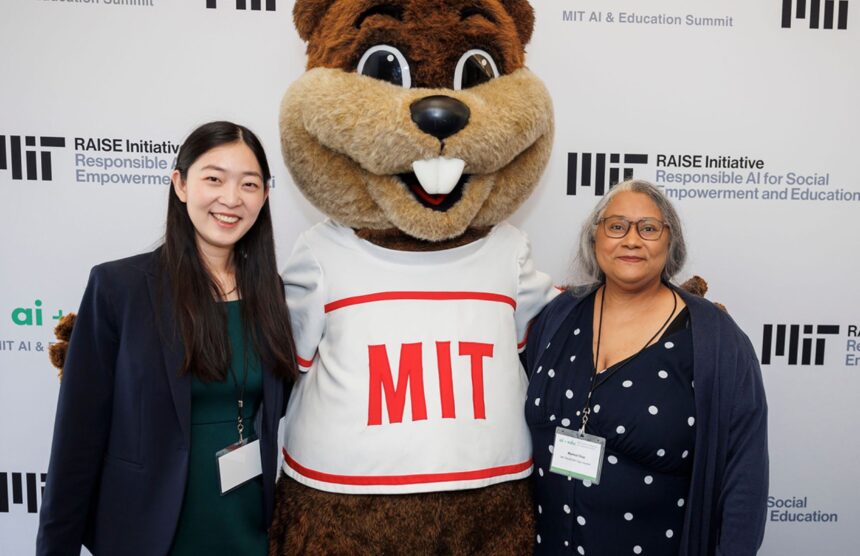Overview
The second MIT AI & Education Summit, hosted by the MIT RAISE Initiative in-person July 16-18, 2025, is where we explore the pivotal role of AI in education and responsible AI use.
The event will cover various themes, including AI literacy, AI-powered tools for education, AI for the global good, and AI-supported personalized learning.
Through talks by world experts in AI education, hands-on workshops, a Climate Challenge, paper presentations, educational panels, and networking events, the Summit aims to excite educators, students, and professionals to embrace AI and collaborate on future initiatives to harness its potential for positive impact in education and beyond. This year we will offer workshops in Portuguese and Spanish sponsored by Google.
As AI continues to evolve, we aim to utilize this summit to reaffirm the need for ongoing dialogue, research, and policy development to ensure its benefits extend to students of all ages and educators objectively.
Last year, along with our 350 attendees, we delved into the immense potential of artificial intelligence to reshape education by emphasizing ethical practices, collaboration, and global perspective, setting the stage for sustained innovation in AI-driven education.
Only plenary talks will be livestreamed. All other activities are fully in-person.
Full Schedule
Subject to change.
Links to full location information was emailed via Eventbrite on July 15. Please check your spam folder if you don’t see it. Posted schedules will be available at check-in.
Breakfast available each morning before the 9 AM main presentation start each day, with workshops and demos taking place in W20.
Wednesday, July 16
- Keynote: Ronit Levavi Morad, Google Research
- Rodrigo Pimentel, Head of Google Education for Latin America
- AI for Creative Learning panel
- Karen Brennan, Harvard University
- Mitch Resnick, MIT Lifelong Kindergarten
- Ying Xu, Harvard University
- Jere Boudell, Clark University
- RAISE Professional Development Workshops
- Hack the Climate Challenge
- Youth Track
- Computational Action using App Inventor in Portuguese
- Computational Action using App Inventor in Spanish
- Shafika Isaacs (UNESCO Chief of Section for AI and Technology)
- Kelly Shiohira (Executive Director, Global Science of Learning Education Network)
- Catalina Rata (UiPath Foundation)
- Rishi Mazumdar (Quest Alliance)
- John Masla (MIT)
- Moderated by Natalie Lao (App Inventor Foundation)
- RAISE Professional Development Workshops
- Hack the Climate Challenge
- Youth Track
- Computational Action using App Inventor in Portuguese
- Computational Action using App Inventor in Spanish
- Limited capacity: Tours of MIT (Meet in W20 lobby)
About the tours:
- Visit and explore the MIT Media Lab, which has pioneered cutting-edge research in robotics, STEM education, wearable computing, and tangible media.
- Visit and explore the Ray and Maria Stata Center, designed by architect Frank Gehry, housing the MIT Computer Science and Artificial Intelligence Lab (CSAIL) and MIT App Inventor.
Thursday, July 17
- Keynote: Salima Monorma Bah, Ministry of Innovation, Sierra Leone
- Global AI Hackathon Final Showcase & Awards
- News and Education in the Era of AI Panel, with Beth Daley (Executive Editor, The Conversation), Nancy Barnes (Executive Editor, Boston Globe), Susan Goldberg (CEO, WGBH), Elena Glassman, Associate Professor, Harvard University
- RAISE Professional Development Workshops
- Hack the Climate Challenge
- Youth Track
- Demos
- RAISE Professional Development Workshops
- Hack the Climate Challenge
- Youth Track
- Limited capacity: Tours of MIT (Meet in W20 lobby)
About the tours:
- Visit and explore the MIT Media Lab.
- Visit and explore the Ray and Maria Stata Center.
Friday, July 18
- Youth in AI Panel, moderated by Eric Klopfer
- Joba Adisa, on CRAFT’s co-design process and outcomes with teachers
- AI Policy for Global Change Panel
- Kevin Morales Chamorro, M.D, MedETechni's approach to teaching healthcare AI to students in Latin America
- Ana Lucía Pérez, Founder of De a Pokito por Puerto Rico
Lightning talks for poster presenters and Hack the Climate entries.
- Certificate presentations for best poster and Hack the Climate Challenge winners
Accommodations
The conference will be hosted at the Massachusetts Institute of Technology in Cambridge, Massachusetts. MIT has several preferred hotels in the area. Read more information on visiting MIT.
Day 1 Speakers

Ronit Levavi Morad
Senior Director and Chief of Staff to VP Yossi Matias, Head of Google ResearchSince joining Google Research, Ronit has been leading strategic efforts to empower and support research teams focused on a range of domains, from Generative AI to Quantum Computing, from Foundational Machine Learning to Algorithms to AI for Societal Impact in Health, Climate, Sustainability, and Education. Ronit's sponsorship of AI for Education initiatives is exemplified by projects like LearnLM, a Gemini-based model fine-tuned for pedagogy, and Text Levelling, a Google Classroom capability that adapts educational content to diverse learning levels.

Karen Brennan
Timothy E. Wirth Professor of Practice in Learning Technologies at the Harvard Graduate School of EducationKaren Brennan is the Timothy E. Wirth Professor of Practice in Learning Technologies at the Harvard Graduate School of Education (HGSE), where she directs the Creative Computing Lab and is also an affiliate in Computer Science. Her research focuses on creating meaningful, inclusive learning experiences in K-12 computer science education. Before joining HGSE, Karen completed her Ph.D. at the MIT Media Lab, where she was part of the team that developed the widely used Scratch programming environment.

Victor Lee
Associate Professor at the Stanford Graduate School of Education and Faculty Lead for the AI + Education initiative at the Stanford Accelerator for LearningVictor Lee is an Associate Professor at the Stanford Graduate School of Education and Faculty Lead for the AI + Education initiative at the Stanford Accelerator for Learning. He is the creator of CRAFT, a co-designed AI curriculum resource library, and leads research on teacher readiness, classroom use of AI, and academic integrity in the age of generative AI. He is also collaborating with Google Research on new curricular materials to support AI literacy.

Rodrigo A. Pimentel
Head of Google Education for Latin AmericaResponsible for leading the Latin America Google for Education business. Pimentel has extensive experience in business development and leadership roles across various industries, including technology and healthcare in companies like Microsoft and General Electric.

Ying Xu
Assistant Professor at the Harvard Graduate School of EducationYing Xu is an Assistant Professor at the Harvard Graduate School of Education, where her research focuses on the design and effectiveness of AI technologies that act as language partners and learning companions for children. She also investigates how AI influences children's social interactions and developmental processes, as well as how collaborative, human-centered approaches can empower educators, caregivers, and other stakeholders to shape AI tools that meet their communities’ needs.

Jere Boudell
Plant Ecologist and Professor of Biology, Clayton State UniversityBoudell explores the intersection of ecology and technology through both artificial intelligence and mobile app development, applies AI tools to ecological research and education, and develops Android apps designed for use in ecology, outreach, and education.
Day 2 Speakers

H.E. Salima Bah
Minister of Communication, Technology and Innovation, Sierra LeoneMadam Salima Monorma Bah was appointed Sierra Leone's Minister of Communication, Technology and Innovation in 2023 and took the oath of office from the President of Sierra Leone, Retired Brigadier Dr. Julius Maada Bio, as the first person to head the newly-created ministry and also one of the youngest Cabinet Ministers. She served as a State Counsel at the Law Officers Department, from where she was seconded to the Directorate of Science, Technology and Innovation (DSTI) as the Policy Lead and head of projects, leading all UNICEF project portfolios. She went to pursue advanced studies by earning a Masters degree (Hons) specialising in Intellectual Property and Technology from Columbia Law School.

Rod McLeod
Vice President of Social Impact, BrazeRod oversees Corporate Social Responsibility, Diversity, Equity, and Inclusion, Sustainability and ESG Reporting, and the Braze for Impact Fund. Before starting the Social Impact Department at Braze, Rod was VP of Corporate Communications and built out the function and the team to support the company’s IPO. Prior to joining Braze, he was VP of Communications at Kik, a popular chat platform that created the cryptocurrency Kin

Mark Friedman
Co-Founder of the App Inventor project and Board Member of App Inventor FoundationMark led App Inventor’s early development as technical lead and manager at Google, and now continues to support its growth as an MIT Research Affiliate at the Computer Science and Artificial Intelligence Laboratory (CSAIL). He has helped grow MIT App Inventor from a small research initiative into a global platform used by millions of students, educators, and professional developers. He remains deeply committed to its mission of democratizing coding and empowering learners around the world. In addition to his work with MIT and Google, Mark has held leadership roles at major tech companies—including Microsoft and Oracle—as well as early-stage startups like Thunkable and Piper.

Natalie Lao
Executive Director of the App Inventor FoundationHer mission is to empower anyone, anywhere, of any age to create meaningful technologies that can transform their lives and the lives of those around them. She fell in love with App Inventor while teaching high school computer science and seeing firsthand how it transformed students from passive consumers into confident, creative tech makers. Since then, she has helped scale its impact globally—starting as an undergraduate research assistant in the MIT App Inventor Lab, where she later earned her B.S., M.Eng., and Ph.D. in Electrical Engineering & Computer Science and AI.

Susan Goldberg
President and CEO, WGBHSusan Goldberg is President and CEO of GBH, America’s preeminent public media organization, the largest producer of PBS content for television and the web, and a major supplier of content for NPR and digital audio services. She is the first woman to serve in this role since GBH was founded in 1951. A nationally recognized journalist and leader, Goldberg has transformed media organizations, taking brands from reverence to relevance by diversifying staff, expanding coverage and executing multi-platform transformation.

Beth Daley
Executive Editor and General Manager, The ConversationA Pulitzer Prize finalist for climate reporting at the Boston Globe, Beth also worked at the New England Center for Investigative Reporting as a reporter and director of partnerships. As Director of Strategic Development at InsideClimate, she worked to diversify the Pulitzer Prize-winning news outlet's revenue stream.

Nancy Barnes
Editor, Boston GlobeNancy Barnes is the editor of The Boston Globe. A veteran journalist who has held the top job at news organizations across the country, Barnes has produced journalism of the highest caliber. Prior to joining the Globe, she was the SVP/News & Editorial Director of NPR from 2018 through 2022, where she led a team of more than 500 journalists and newsroom executives and oversaw NPR's journalism across platforms and around the world.

Elena Glassman
Stanley A. Marks & William H. Marks Professor at the Radcliffe Institute; Assistant Professor of CS, Harvard SEASElena Glassman is the Stanley A. Marks and William H. Marks Professor at the Radcliffe Institute and an Assistant Professor of Computer Science at the Harvard John A. Paulson School of Engineering and Applied Sciences. Her work specializes in human-computer interaction (HCI).Elena designs, builds, and evaluates systems that help people comprehend and interact with population-level patterns in large code and data corpora—advancing how we make sense of complex information at scale.

Max Lu
AI Teaching Fellow at the Harvard Graduate School of EducationMax Lu is a media and education innovator dedicated to making knowledge accessible through emerging AI technologies. Currently pursuing a PhD in Education at Harvard University, his research explores how AI fosters critical thinking, perspective-taking, and self-regulated learning. As the inaugural AI Teaching Fellow at the Harvard Graduate School of Education, Max has led AI literacy initiatives, advised students, and played a key role in shaping the institution’s AI strategy.
Day 3 Speakers

Fernando Reimers
HGSE Professor of International Education and Director of Global Education Innovation InitiativeFernando Reimers is the Ford Foundation Professor of the Practice of International Education and Director of the Global Education Innovation Initiative at Harvard University. He is an elected member of both the U.S. National Academy of Education and the International Academy of Education.
A leading voice in global education, his research and teaching focus on how to prepare children and youth to thrive in the 21st century. He was a member of UNESCO’s Commission on the Futures of Education, which authored the landmark report Reimagining Our Futures Together: A New Social Contract for Education.

Felipe Neves
Head of Google Workspace and Gemini for Education in Latin AmericaFelipe Neves is the Head of Google Workspace and Gemini for Education in Latin America, where he leads efforts to integrate AI into classrooms and institutions across the region. He holds a Master’s degree in International Law and Business from Stanford University and has worked extensively across Brazil and Latin America to expand access to education and digital tools. In 2018, Forbes Brazil recognized Felipe as one of the country’s most influential young leaders in its “30 Under 30” list for his contributions to education and technology.

Ana Lucía Pérez Escalera
Founder of NGO De a Pokito por Puerto RicoAna Lucía Pérez Escalera is a 13-year-old homeschooled student from Puerto Rico. She is passionate about Science, Art, and Technology. As a self-taught person, Ana Lucía is always searching for new opportunities to develop her knowledge. She is the founder of a non-profit organization called De a Pokito por Puerto Rico, which educates about the importance of caring for the environment through STEAM.

Dr. Kevin Morales Chamorro
CEO and founder of MedETechniDr. Kevin Morales Chamorro is a medical doctor, entrepreneur, and researcher recognized for his work in medical innovation across Latin America. He is the CEO and founder of MedETechni, a company developing AI-powered and UV-based solutions to combat infections and accelerate wound healing. Kevin is a member of IEEE, an MIT Innovators Under 35 honoree, a YLAI Fellow, and was named to Forbes 30 Under 30. He also mentors young scientists through the Scientific Caribbean Foundation Inc., promoting education and innovation in underserved communities.

'Joba Adisa
Postdoctoral Fellow at Stanford's Graduate School of EducationIbrahim ('Joba) Adisa is a Human-Centered AI (HAI) Postdoctoral Fellow at Stanford's Graduate School of Education, collaborating with Dr. Victor Lee on advancing research to promote AI literacy in K-12 education. His research lies at the intersection of learning sciences, computing education, data science, and AI literacy. He focuses on developing tools and curricula resources that enhance data literacy and promote creativity, computational thinking, and collaborative problem-solving with AI in K-12 education.

Taylor Reynolds
Technology Policy Director, MIT’s Internet Policy Research InitiativeTaylor is the technology policy director of MIT’s Internet Policy Research Initiative. In this role, he leads the development of this interdisciplinary field of research to help policymakers address cybersecurity and Internet public policy challenges. He is responsible for building the community of researchers and students from departments and research labs across MIT, executing the strategic plan, and overseeing the day-to-day operations of the Initiative.
Taylor’s current research focuses on three areas: leveraging cryptographic tools for measuring cyber risk, cyber risk modeling, and international AI policy.
Taylor was previously a senior economist at the OECD and led the organization’s Information Economy Unit covering policy issues such as the role of information and communication technologies in the economy, digital content, the economic impacts of the Internet and green ICTs. His previous work at the OECD concentrated on telecommunication and broadcast markets with a particular focus on broadband.
Before joining the OECD, Taylor worked at the International Telecommunication Union, the World Bank and the National Telecommunications and Information Administration (United States). Taylor has an MBA from MIT and a Ph.D. in Economics from American University in Washington, DC.
Sponsors
The MIT AI & Education Summit is sponsored in part by Google for Education. As a sponsor, you can be a part of this open event as together we guide this AI generation along their journey. See the Sponsorship Guide here for more information.

FAQs
- $650 is for all three days of access to the main talks.
- Prices for single-day registration options vary by day.
- The $100 remote option will only allow live streaming of talks taking place in the main lecture hall (10-250).
Yes, please review the preferred hotels and request an MIT rate if available, since you will be attending an event at MIT.
The closest hotels to the event location are:
Refunds are available only until July 2, 2025, 14 days before the event. Only the cost of registration will be refunded. Eventbrite fees will not be refunded.
In the unlikely event that the event is canceled, then you will receive a full refund.
Please send an email to mit-aieducationsummit@mit.edu.
Business casual.
There will be a registration desk outside the Sala de Puerto Rico on the second floor of MIT Building W20.
If the event is not sold out, you can purchase tickets via Eventbrite as above. A link will be made available at the registration desk on July 16. Rates will be $150 higher than regular registration fees, and no refunds will be issued.
No.
There is a 2-for-1 deal offered until May 11 or until the 100 available slots for this promotion are sold out. Please see Eventbrite for the event for more information.
The same 2-for-1 deal applies to groups.
Yes, at the meal breaks each day and at a reception on the evening of July 17.
No.
Yes. Vegetarian, vegan, and non-dairy options are available.
- There will be an evening reception on July 17th. It is open to all registered attendees. Badges must be worn at all times.
- There are limited MIT tours for up to 40 people of the MIT Media Lab and Stata Building on July 16th. Sign up at the registration desk after the lunch break.
- There is a visit limited to 20 attendees to the MIT Museum on July 17th. Sign up at the registration desk after the lunch break.
- Be respectful of others.
- When presenting, honor time limits.
- Participate by sharing your own opinions and experiences.
- Listen and consider the opinions of others.
- Be willing to experiment with ideas and techniques presented by others.
Email your request to mit-aieducationsummit@mit.edu.
No.
Please send an email to mit-aieducationsummit@mit.edu.
Yes, after the event via a survey.
No.
Yes, there are workshops on RAISE Professional Development for educators and workshops in Portuguese and Spanish.
Yes, Hack the Climate Challenge winners will receive certificates and poster contests will be judged by attendees and receive certificates.
Yes, we will use the hashtag #MIT-AIED and the RAISE LinkedIn page.
Yes, please send an email to mit-aieducationsummit@mit.edu.
Calls
All papers/posters must be presented in-person at the Summit. For co-authored papers/posters, at least one co-author must present in-person. There will be no virtual presentations.
SUBMISSIONS FOR PAPERS AND POSTERS ARE NOW CLOSED
Youth Calls for Papers and Posters
Call for Papers (Youth)
Chaired by Dr. Natalie Lao (natalie@appinventorfoundation.org) and Daniella DiPaola (dipaola@mit.edu). Submissions are due by 11:59 PM EDT on May 4, 2025. You must present the paper at the Summit. Accepted papers will be organized into two tracks. Paper topics for each track include but are not limited to:
- Track 1: Research (e.g. studies in education or AI usage in the classroom)
- Results for AI in Education Research (e.g. Practices in teaching AI, Using AI to improve or enhance teaching, AI tutors, Generative AI in Education)
- Assessment and Feedback with AI (e.g. AI for grading and feedback, Adaptive learning analytics)
- Track 2: Innovative Applications of AI
- Computational Thinking / Computational Action (e.g. new AI tools for good)
- Data Science in Action (e.g. Climate and sustainability, Health and Wellness, Biotechnology, etc.)
Submissions should be 2 – 4 pages without references. All of the authors of each paper must be 18-years-old or younger, or have just completed their final year of 12th grade. Accepted papers are published under the Creative Commons 4.0 International Share-Alike license.
Call for Posters (Youth)
Chaired by Dr. Natalie Lao (natalie@appinventorfoundation.org) and Daniella DiPaola (dipaola@mit.edu). Submissions are due by 11:59 PM EDT on May 4, 2025. You must present the poster at the Summit. Poster topics include but are not limited to:
- Case Studies on AI in Education (e.g., Best practices for teaching AI, Curriculum examples, AI-enhanced instruction, AI tutors, Generative AI in education)
- Assessment and Feedback with AI (e.g. AI for grading and feedback, Adaptive learning analytics)
- Demonstrations of Innovative AI Applications (e.g. Computational Thinking / Computational Action, New AI tools for good)
Poster abstract submissions are limited to 250 words and up to three images. All of the authors of each poster must be 18-years-old or younger, or have just completed their final year of 12th grade. If accepted, the final poster may contain additional text and images. Poster size will be up to 3 ft x 4 ft, in either portrait or landscape orientation. Accepted papers are published under the Creative Commons 4.0 International Share-Alike license.
Call for Position Papers (Youth)
Chaired by Dr. Natalie Lao (natalie@appinventorfoundation.org) and Daniella DiPaola (dipaola@mit.edu). Submissions are due by 11:59 PM EDT on May 4, 2025. Accepted papers will be presented at a Special Workshop session at the Summit. Student-led position papers on generative AI use in the classroom for presentation. Paper topics include but are not limited to:
- Proposal or essay on your school, local government, or national AI education policy, and your reflections on the policy. (e.g. What is your school’s AI policy, and what do you think about it? How does it connect to your learning goals?)
- Essay on the future of AI usage in the classroom. (e.g. What do we need to do to promote better AI development for educational use? How might educational goals in the classroom change?)
- Essay on your own experiences in AI education policy (e.g. Did you help your school design an AI policy? What are your reflections on the process?)
Submissions should be 2 – 4 pages on US letter-sized paper. Additional diagrams or sketches may also be submitted. Each paper must include at least one student and at least one adult mentor (e.g., a teacher or administrator). We welcome international submissions to encourage a wide range of perspectives on the purpose of education and the changing role of AI. Accepted papers are published under the Creative Commons 4.0 International Share-Alike license.
Once papers are accepted, you will have the option to work with MIT RAISE researchers to further develop your position paper. Limited funds are available for accepted students.
Want to submit but not sure where to start? Check out this CivicMind tool developed by MIT researcher Minseok Jung (msjung@mit.edu) tailored for educational policy writing.
Main Calls for Papers and Posters
Call for Papers
Chaired by Dr. Evan Patton (ewpatton@mit.edu) and Raechel Walker (raechelw@media.mit.edu). Submissions are due by 11:59 PM EDT on May 4, 2025. You must present the paper at the Summit. Submissions should be 2 – 4 pages without references. The organizers of the MIT AI & Education 2025 Summit presented by MIT RAISE are calling for paper submissions relevant to the field of AI & Education. Accepted papers will be presented at the Summit. Accepted papers will be organized into two tracks. Paper topics for each track include but are not limited to:
- Track 1: Research (e.g. studies in education or AI usage in the classroom)
- Results for AI in Education Research (e.g. Practices in teaching AI, Using AI to improve or enhance teaching, AI tutors, Generative AI in Education)
- Assessment and Feedback with AI (e.g. AI for grading and feedback, Adaptive learning analytics)
- Track 2: Innovative Applications of AI
- Computational Thinking / Computational Action (e.g. new AI tools for good)
- Data Science in Action (e.g. Climate and sustainability, Health and Wellness, Biotechnology, etc.)
Accepted papers are published under the Creative Commons 4.0 International Share-Alike license.
Call for Posters
Chaired by Dr. Evan Patton (ewpatton@mit.edu) and Raechel Walker (raechelw@media.mit.edu). Poster abstract submissions are due by 11:59 PM EDT on May 4, 2025. You must present the paper at the Summit. Poster abstract submissions are limited to 250 words and up to three images. The organizers of the MIT AI & Education 2025 Summit presented by MIT RAISE are calling for poster submissions relevant to the field of AI & Education. Accepted posters will be presented at the Summit. Poster topics include but are not limited to:
- Case Studies on AI in Education (e.g., Best practices for teaching AI, Curriculum examples, AI-enhanced instruction, AI tutors, Generative AI in education)
- Assessment and Feedback with AI (e.g. AI for grading and feedback, Adaptive learning analytics)
- Demonstrations of Innovative AI Applications (e.g. Computational Thinking / Computational Action, New AI tools for good)
If accepted, the final poster may contain additional text and images. Poster size will be up to 3 ft x 4 ft, in either portrait or landscape orientation. Accepted papers are published under the Creative Commons 4.0 International Share-Alike license.
